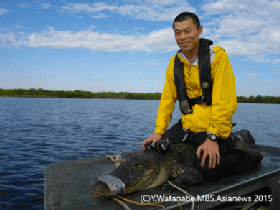受賞

情熱大陸「海洋生物学者・渡辺佑基」編
写真提供:渡辺佑基氏・国立極地研究所
ASIANEWS制作「情熱大陸」がドイツ・ワールドメディアフェスティバル銀賞受賞
ドキュメンタリー:リサーチ・科学部門
2015年にドイツ・ハンブルクで行われたワールド・メディア・フェスティバルにおいて、毎日放送制作・全国TBS系列で放送した「情熱大陸・海洋生物学者渡辺佑基編」が、ドキュメンタリー部門で銀賞を受賞しました。
2000年から始まった同フェスティバルは、娯楽、ドキュメンタリ、ニュースなどのテレビ番組からアニメーション、広告、ウエブデザインなどを含めた総合メディアコンテスト。2015年は37か国から700を超える作品のエントリーがありました。
A Passionate Challenger: Biologist Unlocks the Secret Life of Marine Animals
番組内容:
いまだ謎が多い海洋生物の生態を独特の手法で調査し、世界で認められた生物学者がいる。渡辺佑基、36歳だ。
渡辺の研究するバイオロギング(=直訳すると生体記録)は、生物学の中でもここ20年で急速に発展した新しい分野だ。彼の手法は独特で、あらゆる水中生物に“データロガー”と呼ばれる行動記録計と小型カメラを取り付け、生態の解明に挑んでいる。その渡辺が南極観測隊員として、アデリーペンギンにカメラを装着してとらえた映像は、これまで調べられなかった「自然界での捕食シーン」を克明に記録しており話題となった。全世界をフィールドに研究活動をすることから、渡辺は「生物学会のインディ・ジョーンズ」呼ばれている。
番組は、北海道・天売島の海鳥・ウトウや岩手県・大槌のマンボウなどを調査する渡辺に3年にわたり密着。世界初公開となる、オーストラリア・タスマニア島のエビスザメの映像などをお送りする。番組サイトはこちら
A Passionate Challenger | Biologist Unlocks the Secret Life of Marine Animals
The behavior of marine animals still remains a mystery. A world-renowned biologist, Yuki Watanabe,researches and records their behavior using a method called bio logging. By attaching a motionrecorder called logger and a miniature camera to the animal, the secret lives of these animalsbecome clearer through captured footage. It is the most advanced field of research that hasrapidly developed over the last 20 years in the biology field.
Watanabe’s biggest accomplishment is the invention of logger retrieval system. Until now,bio logging was limited to animals that returned to their nest since that was the only way thelogger could be retrieved. But Watanabe solved this problem by utilizing IT equipment andintelligence which instantly broadened the field of research. Joint research offers flocked toWatanabe from around the world and he became known as the “Indy Jones of the biologicalworld.”
When Watanabe went to Antarctica as a member of the Antarctic expedition team, he capturedfootage of the Adelie penguin by attaching a camera to the penguin. That footage has garnered alot of attention as it is the first time anyone has clearly seen a penguin eating its prey in itsnatural setting. It has been assumed that tuna swim at a high speed at almost 80 km/hour. Butbased on Watanabe’s research, they swim at about 3 – 8 km/hour. Even inemergency situations, they only reach speeds of up to 30 km/hour. In this way, Watanabe works toclarify the behavior and habits of marine animals which are often shrouded in mystery.
The program follows Mr. Watanabe for three years. It introduces a joint research project he didwith Australia’s Tasmania University on the broadnose sevengill shark. It also presents a lotof the world premier footages, captured by cameras attached to marine animals.
ASIANEWSスタッフ
演出:板倉弘明 撮影:中村朋治 取材:中野健太 AP:長田弘彦
関連するページ
毎日放送プレスリリース こちら
ドイツ・ワールドメディアフェスティバル http://archive.worldmediafestival.org/
放送記録 こちら